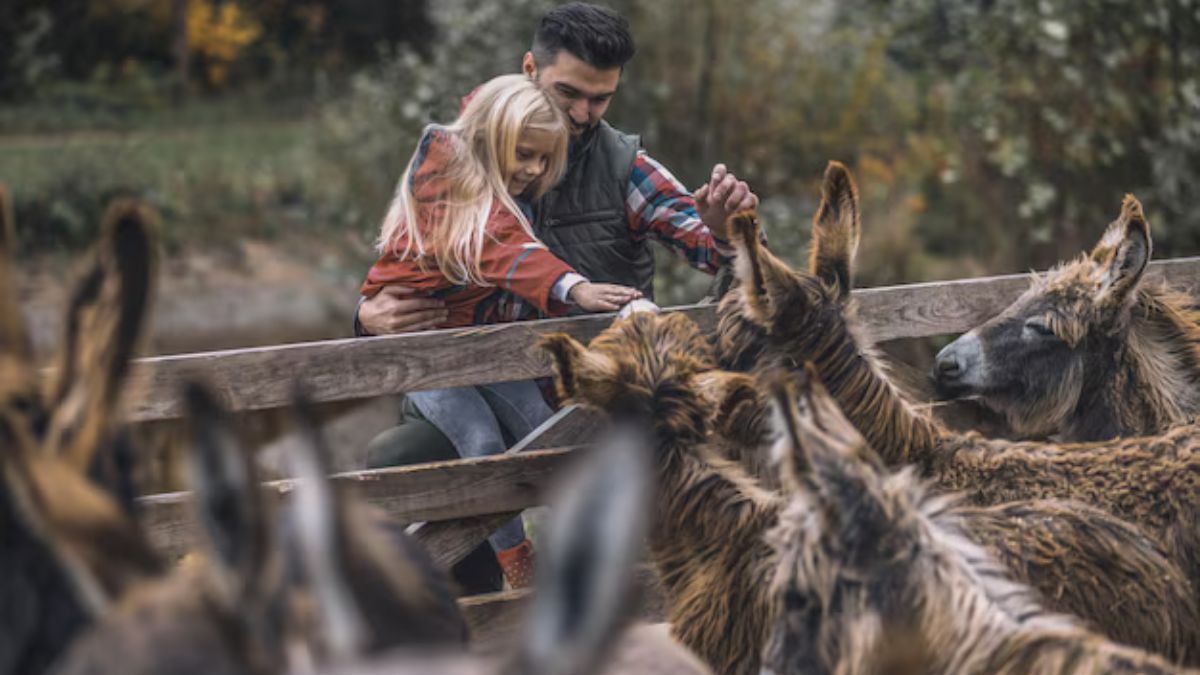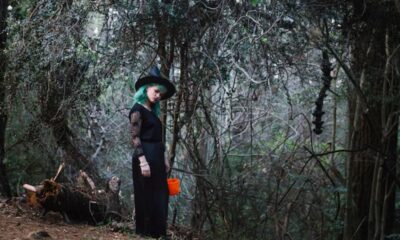EDUCATION
Zooskooñ Uncovered: Behind the Scenes of a Unique Animal Sanctuary

Introduction to Zooskooñ
Nestled in a scenic landscape, Zooskooñ stands out as more than just an animal sanctuary. It’s a haven for wildlife and a vibrant community hub dedicated to conservation and education. As soon as you step through the gates, you’re greeted by the sounds of nature and the sights of animals thriving in their habitats. But what really goes on behind those walls? What makes this place so special? Join us as we dive deep into the heart of Zooskooñ, uncovering its history, mission, and unique features that set it apart from traditional zoos. Whether you’re an animal lover or simply curious about what happens beyond public view, there’s much to discover at this extraordinary sanctuary.
History and Mission of the Sanctuary
Zooskooñ began as a humble refuge in the late 1990s. Founded by a passionate group of wildlife enthusiasts, it aimed to provide shelter for injured and orphaned animals. Over the years, this vision blossomed into a full-fledged sanctuary dedicated to conservation.
The mission is clear: rescue, rehabilitate, and release whenever possible. Zooskooñ believes every animal deserves a second chance at life. This commitment extends beyond individual care; it encompasses broader efforts in education and habitat preservation.
By partnering with local communities, Zooskooñ strives to raise awareness about endangered species and their environments. Through workshops and outreach programs, they inspire people to take part in conservation efforts.
This unique sanctuary not only serves animals but also fosters an appreciation for nature among visitors. The history of Zooskooñ is rooted deeply in compassion and dedication to preserving our planet’s precious wildlife.
Animal Care and Conservation Efforts
At Zooskooñ, animal care is paramount. Each resident receives personalized attention tailored to their needs. The sanctuary prioritizes a natural environment that mimics the animals’ wild habitats.
Dedicated staff work tirelessly to ensure proper nutrition and health care for every species. From daily veterinary check-ups to enriching activities, every aspect of their well-being is covered.
Conservation efforts play a critical role at Zooskooñ. The sanctuary collaborates with wildlife organizations worldwide, focusing on protecting endangered species. They run breeding programs aimed at increasing populations of vulnerable animals.
Education is also key here. Visitors learn about biodiversity and the importance of conserving ecosystems through interactive exhibits and workshops. This commitment not only helps wildlife but inspires future generations to advocate for our planet’s creatures as well.
Unique Features and Attractions at Zooskooñ
Zooskooñ boasts several unique features that set it apart from traditional zoos. One standout attraction is the immersive habitat design, where visitors can walk through lush environments mimicking natural ecosystems. This brings guests closer to wildlife while promoting a sense of connection with nature.
The sanctuary also offers interactive programs that allow guests to feed certain animals under zookeeper supervision. These experiences foster education about animal diets and behaviors in a hands-on manner.
A highlight for many is the twilight tours, which provide an opportunity to see nocturnal species come alive after dark. The atmosphere shifts dramatically as sounds and sights change, giving participants a different perspective on animal life.
Art installations throughout Zooskooñ celebrate wildlife conservation themes, making each visit not only entertaining but enriching as well. These creative expressions remind everyone of the importance of protecting our planet’s diverse creatures.
Behind the Scenes: A Day in the Life of a Zookeeper
At Zooskooñ, a zookeeper’s day begins with the sunrise. The sounds of animals waking up fill the air, creating a lively atmosphere. Each morning starts with feedings—important tasks that require attention to detail and knowledge about each species.
After breakfast, zookeepers conduct health checks. They observe animal behavior and look for any signs of distress or illness. This critical step ensures all residents are thriving in their environment.
Cleaning enclosures follows next. It’s not just about hygiene; it’s also about enriching habitats to mimic natural settings as closely as possible. Zookeepers often spend time studying animals to understand their needs better.
Afternoons involve educational programs, where zookeepers share stories with visitors. These interactions help raise awareness about wildlife conservation and the importance of protecting vulnerable species.
Every day brings new challenges at Zooskooñ, keeping the work exciting and fulfilling for those passionate about animal care.
The Impact of Zooskooñ on Local Communities
Zooskooñ has become a beacon of hope for local communities. It offers more than just animal exhibits; it fosters education and awareness. Schools often schedule field trips, allowing students to learn about wildlife conservation firsthand.
The sanctuary also creates jobs, contributing to the local economy. Zookeepers, educators, and support staff form an integral part of the community’s workforce. Their passion for animals enriches not only their lives but those around them.
Additionally, Zooskooñ engages in outreach programs that connect residents with nature. Workshops on sustainable practices are regularly held, teaching families how to coexist harmoniously with wildlife.
Local artists and vendors have found a platform within the sanctuary too. They showcase their work during events hosted at Zooskooñ, promoting cultural exchange while supporting small businesses in the area.
Through these initiatives, Zooskooñ strengthens community bonds and inspires collective action toward environmental stewardship.
Controversies and Criticisms of Zooskooñ
Zooskooñ has faced its share of controversies. Critics often argue about the ethics of keeping animals in captivity, regardless of how spacious their enclosures are.
Animal rights activists question whether any sanctuary can truly replicate an animal’s natural habitat. They voice concerns over specific practices and the overall treatment of residents within Zooskooñ.
Some visitors express dissatisfaction with perceived limitations on certain species’ interactions or educational experiences. Concerns arise regarding transparency in animal care and conservation efforts.
On social media, debates spark regularly around Zooskooñ’s methods versus traditional zoos. The sanctuary’s unique approach creates both advocates and detractors, leading to ongoing discussions about ethical standards in animal sanctuaries.
Amidst criticism, supporters highlight Zooskooñ’s dedication to education and rehabilitation efforts. This delicate balance between advocacy for wildlife preservation and public sentiment continues to evolve as conversations unfold.
Future Plans for Zooskooñ
Zooskooñ is gearing up for an exciting future. Plans are underway to expand its educational programs, making them more interactive and accessible. The sanctuary aims to engage visitors of all ages in conservation efforts.
Innovative habitats for the animals are also on the horizon. These new spaces will mimic natural environments, enhancing animal well-being and visitor experiences alike.
The sanctuary is also looking into advanced technologies for tracking wildlife health and behavior, which could provide valuable insights into animal care.
Sustainable practices remain a key focus as Zooskooñ explores eco-friendly initiatives. From renewable energy sources to waste reduction strategies, every step is aimed at minimizing environmental impact.
Collaboration with local schools and organizations will strengthen community ties, fostering a culture of compassion towards wildlife. Zooskooñ’s vision embraces growth while staying true to its mission of education and conservation.
Conclusion
Zooskooñ is more than just an animal sanctuary; it’s a vibrant community hub dedicated to education, conservation, and the well-being of animals. By bridging the gap between wildlife and people, Zooskooñ fosters a deeper understanding of our planet’s biodiversity.
The unique experiences offered at this sanctuary allow visitors to connect with nature in meaningful ways. Whether it’s through interactive programs or behind-the-scenes tours, each visit leaves a lasting impression.
As Zooskooñ continues its mission to protect endangered species and educate future generations about environmental stewardship, it remains a beacon of hope for animal lovers everywhere. The ongoing commitment to transparency and improvement reflects the sanctuary’s desire not only for growth but also for collaboration within local communities.
With plans on the horizon that promise even greater contributions to wildlife preservation and public engagement, Zooskooñ stands poised as an essential player in global conservation efforts. It invites everyone on this journey—because protecting our world is a shared responsibility we all must embrace.
EDUCATION
Unlocking the Potential of Classroomus.85 Tips for Educators

Introduction to Classroomus
Welcome to the world of Classroomus, where education meets innovation! In an age where technology shapes the learning experience, educators are constantly seeking tools that enhance engagement and streamline teaching practices. Classroomus.85 is one such powerful platform designed specifically for educators like you. Imagine having a digital space that fosters collaboration, supports personalized learning, and simplifies assessment—all at your fingertips.
This blog post will explore 85 tips that unlock the full potential of Classroomus. Whether you’re a seasoned pro or just getting started with this dynamic tool, these insights will help transform your classroom into an interactive hub of creativity and knowledge sharing. Get ready to dive deep into features tailored for both teachers and students alike!
Benefits of Using Classroomus in Education
Classroomus revolutionizes the learning experience for both educators and students. Its user-friendly interface makes it easy to navigate, reducing the learning curve typically associated with new technology.
One major benefit is enhanced collaboration. Students can seamlessly work together on projects, share resources, and provide feedback in real-time. This fosters a sense of community and encourages active participation.
Personalization is another key advantage. Educators can tailor lessons to meet individual student needs, ensuring that everyone progresses at their own pace. This adaptability contributes to improved learning outcomes.
Additionally, Classroomus supports various teaching styles through diverse multimedia tools. Whether it’s video lectures or interactive quizzes, teachers have multiple options to engage learners effectively.
The platform also streamlines administrative tasks like grading and attendance tracking. By automating these processes, educators can devote more time to teaching rather than paperwork.
Tips for Setting Up a Successful Classroomus Environment
Creating a successful Classroomus environment begins with organization. Set up your virtual classroom space clearly, ensuring essential resources are easily accessible to both you and your students.
Establish consistent routines. Having a predictable schedule can help students feel secure and ready to engage with the content. Regular updates keep everyone informed about upcoming tasks or changes.
Encourage an open communication culture. Utilize Classroomus tools that allow for real-time discussions and feedback. This keeps students connected and invested in their learning journey.
Don’t forget about visual appeal! Use engaging graphics or themes within Classroomus to create an inviting atmosphere that reflects your teaching style.
Foster collaboration by forming small groups for projects or discussions. Mixing diverse skill sets enhances peer learning, making lessons more dynamic and interactive.
Collaboration and Communication Tools on Classroomus
Collaboration is at the heart of Classroomus. The platform offers a range of tools designed to enhance communication among students and educators alike.
Real-time messaging allows for instant feedback and guidance. This feature fosters an open line between teachers and their classes, making it easier to address questions or concerns promptly.
Discussion boards create opportunities for in-depth conversations. Students can share ideas and collaborate on projects outside regular class hours, enriching their learning experience.
Group work becomes seamless with shared documents. Educators can set up collaborative assignments where students contribute simultaneously, promoting teamwork skills essential for the future.
Video conferencing tools enable virtual meet-ups. Whether it’s a guest speaker or group discussions, these features help bridge distance gaps while maintaining personal connections within the classroom community.
With Classroomus, collaboration transforms from a traditional approach into an interactive journey that empowers every learner involved.
Assessment and Grading Features on Classroomus
Classroomus offers innovative assessment and grading features designed to simplify the evaluation process for educators. With a user-friendly interface, teachers can easily create quizzes, assignments, and tests tailored to their curriculum.
Real-time feedback is a standout feature. Students receive immediate insights on their performance, which fosters a growth mindset. This instant communication helps them understand areas needing improvement without delay.
The platform also supports customizable rubrics. Educators can define specific criteria for each assignment, ensuring transparency in how grades are determined. This flexibility empowers teachers while providing clarity for students.
Additionally, Classroomus allows for integration with various grading scales. Whether you prefer letter grades or percentages, adapting your system is seamless.
Data analytics provide another layer of support by tracking student progress over time. These insights help identify trends or learning gaps that might require further attention from educators.
Personalization and Differentiation with Classroomus
Personalization is a game changer in education. Classroomus allows educators to tailor learning experiences to meet the diverse needs of their students.
With its flexible tools, teachers can create customized lesson plans that cater to different learning styles and paces. Whether it’s visual aids for visual learners or interactive quizzes for those who thrive on engagement, Classroomus offers options galore.
Differentiation becomes seamless with this platform. Educators can easily assign tasks based on individual student abilities, ensuring everyone progresses at their own speed. The ability to monitor each student’s journey fosters growth and boosts confidence.
Moreover, feedback can be personalized too. Teachers can provide specific insights tailored to each learner’s performance, promoting effective improvement strategies.
Classroomus enhances educational equity by making every student feel valued through individualized attention and resources designed just for them. This focus not only enriches the classroom experience but also helps cultivate lifelong learners ready for future challenges.
Integrating Technology into Lesson Plans with Classroomus
Integrating technology into lesson plans can transform the classroom experience. Classroomus provides a platform that makes this seamless and engaging.
Start by exploring its diverse tools. Use multimedia resources like videos, podcasts, or interactive quizzes to enhance understanding. These elements cater to various learning styles, making lessons more inclusive.
Encourage student collaboration with features that allow them to work together on projects in real-time. This not only fosters teamwork but also builds essential 21st-century skills.
Incorporate gamification aspects of Classroomus into your teaching strategy. Friendly competition can motivate students and make learning enjoyable.
Don’t forget about feedback mechanisms available within the platform. They enable instant responses from peers and educators alike, ensuring continuous improvement throughout the learning process.
Strategies for Engaging Students on Classroomus
Engaging students on Classroomus requires creativity and adaptability. Start by incorporating interactive elements into your lessons. Use quizzes, polls, and discussion boards to foster participation.
Gamification can also heighten interest. Introduce challenges or badges for completing tasks, which encourages a friendly competitive spirit among students.
Encourage collaboration through group projects. Assign roles within teams so every student feels valued and responsible for their contribution.
Utilize multimedia resources like videos or podcasts to cater to different learning styles. Visuals can help clarify complex concepts while keeping the content dynamic.
Regularly check in with your students through surveys or feedback forms. This not only helps you gauge their engagement levels but empowers them to share their thoughts openly.
Maintain an inviting atmosphere where questions are welcomed. A supportive environment promotes curiosity and active participation in discussions.
Student Data Tracking and Analysis on Classroomus
Tracking student data is crucial for effective teaching. Classroomus makes this process seamless and intuitive. Educators can easily monitor attendance, assignments, and grades in one centralized platform.
The analytics feature helps identify trends and patterns in student performance. By reviewing these insights, teachers can tailor their approaches to meet individual needs. This customization leads to a more engaging learning experience.
Additionally, Classroomus allows for real-time updates on student progress. Teachers receive immediate feedback that can guide lesson adjustments or support interventions when necessary.
Data visualization tools enhance understanding by presenting information clearly. Charts and graphs make it easier to spot areas needing attention or improvement.
By leveraging these capabilities within Classroomus, educators not only track performance but also foster a culture of accountability among students. They become active participants in their own learning journeys through informed discussions about their progress.
Troubleshooting Common Issues
Navigating new platforms can come with its challenges. Classroomus.85 is no exception. However, knowing how to troubleshoot common issues can save educators valuable time and reduce frustration.
First, ensure that your internet connection is stable. A weak or intermittent signal can cause various problems, from slow loading times to disconnections during important lessons.
If you experience difficulties logging in, double-check your username and password for accuracy. Resetting your password can often resolve access issues quickly.
For those encountering glitches with assignments or grades not displaying correctly, refreshing the page might do the trick. This simple step resolves many temporary software hitches.
When it comes to communication tools within Classroomus.85, make sure notifications are enabled so you don’t miss important announcements from students or colleagues. If messages aren’t sending as expected, verify that all users have updated their application versions.
Sometimes the features may not work as intended due to browser compatibility issues; using a different web browser could alleviate these concerns immediately.
Don’t hesitate to reach out for support if persistent problems arise—Classroomus has resources available to assist educators effectively.
Staying informed about updates and changes made by Classroomus will also help minimize disruptions in teaching practices while enhancing overall user experience on this innovative platform!
-

 TECHNOLOGY1 year ago
TECHNOLOGY1 year agoTop 5 Tips for Mastering in_a_dndmixin_drag in Your Campaigns
-

 TOPIC1 year ago
TOPIC1 year agoExploring the History and Culture of Rosewellsk
-

 TECHNOLOGY1 year ago
TECHNOLOGY1 year agoYMoviesHD vs Other Streaming Platforms: A Comprehensive Comparison
-

 TOPIC1 year ago
TOPIC1 year agoBehind the Scenes: The Philosophy and Vision of PhmHaven
-

 TOPIC1 year ago
TOPIC1 year agoThe Rise of Tribute Printed Pics: Honoring Life Through Photography
-

 TOPIC1 year ago
TOPIC1 year agoA Beginner’s Journey with Lwedninja: From Novice to Pro
-

 TOPIC1 year ago
TOPIC1 year agoIs Finizona Free? Unpacking the Costs Behind This Popular Platform
-

 TOPIC1 year ago
TOPIC1 year agoDecoding m0therearf: Why This Buzzword Matters in Today’s Culture
